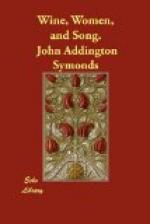Spring is coming! longed-for
spring
Now his joy discloses;
On his fair brow in a ring
Bloom empurpled
roses!
Birds are gay; how sweet their
lay!
Tuneful is the
measure;
The wild wood grows green
again,
Songsters change our winter’s
pain
To a mirthful
pleasure.
Now let young men gather flowers,
On their foreheads
bind them,
Maidens pluck them from the
bowers,
Then, when they
have twined them,
Breathe perfume from bud and
bloom,
Where young love
reposes,
And into the meadows so
All together laughing go,
Crowned with ruddy
roses.
Here again the nightingale’s song, contending with the young man’s heart’s lament of love, makes itself heard.
THE LOVER AND THE NIGHTINGALE.
No. 7.
These hours of spring are jolly;
Maidens, be gay!
Shake off dull melancholy,
Ye lads, to-day!
Oh! all abloom am I!
It is a maiden love that makes me sigh,
A new, new love it is wherewith I die!
The nightingale is singing
So sweet a lay!
Her glad voice heavenward flinging—
No check, no stay.
Flower of girls love-laden
Is my sweetheart;
Of roses red the maiden
For whom I smart.
The promise that she gives me
Makes my heart bloom;
If she denies, she drives me
Forth to the gloom.
My maid, to me relenting,
Is fain for play;
Her pure heart, unconsenting,
Saith, “Lover, stay!”
Hush, Philomel, thy singing,
This little rest!
Let the soul’s song rise ringing
Up from the breast!
In desolate Decembers
Man bides his time:
Spring stirs the slumbering embers;
Love-juices climb.
Come, mistress, come, my maiden!
Bring joy to me!
Come, come, thou beauty-laden!
I die for thee!
O all abloom am I!
It is a maiden love that makes me sigh,
A new, new love it is wherewith I die!
There is a very pretty Invitation to Youth, the refrain of which, though partly undecipherable, seems to indicate an Italian origin. I have thought it well to omit this refrain; but it might be rendered thus, maintaining the strange and probably corrupt reading of the last line:—
“List, my fair, list,
bela mia,
To the thousand charms of
Venus!
Da hizevaleria.”
THE INVITATION TO YOUTH.
No. 8.
Take your pleasure, dance
and play,
Each with other while ye may:
Youth is nimble, full of grace;
Age is lame, of tardy pace.
We the wars of love should
wage,
Who are yet of tender age;
’Neath the tents of
Venus dwell
All the joys that youth loves
well.




